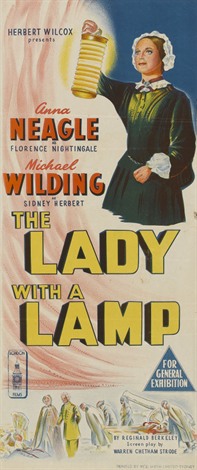Critical reception
The Monthly Film Bulletin wrote: "What the handling and the performance conspicuously and disastrously lack is the quality of toughness – physical, mental and moral – which was the basis of Florence Nightingale's character. ... Anna Neagle's performance, although marked by obvious sincerity of intention, has softened the redoubtable Florence Nightingale into a figure of dull and conventional nobility. These defects in conception apart, the film is a slow, sedate, refined chronicle which rises to drama only on the very rare occasions when the material itself takes command." [7]
TV Guide gave the film three out of four stars, and noted, "the contrast in settings--between stately British homes and the squalor of the hospital--focuses the viewer's attentions on what the real battles were. Honorable mention should be given to Lewthwaite's editing of the war sequences." [8]
Leonard Maltin also gave the film three out of four stars, noting a "Methodical recreation of 19th- century nurse-crusader Florence Nightingale, tastefully enacted by Neagle." [9]
Variety observed, "Anna Neagle adds another portrait to her screen gallery of famous women. Her characterization of Florence Nightingale is a sincerely moving study...Michael Wilding is not too happily cast as Sidney Herbert, War Minister. Within limitations, he makes the best of this part. The strong feature cast includes Felix Aylmer, with an exceptionally good study of Lord Palmerston. Herbert Wilcox, as always, directs in a plain, straightforward manner." [10]
According to academics Sue Harper and Vince Porter, "The film is poor on characterization and concentrates on Nightingale’s powers of social consolidation by combining female energy with an insistence on ‘duty’. This was Wilcox’s last attempt to play innovation against tradition. After this, his films always embraced traditional structures of feeling with disastrous box office results." [11]
